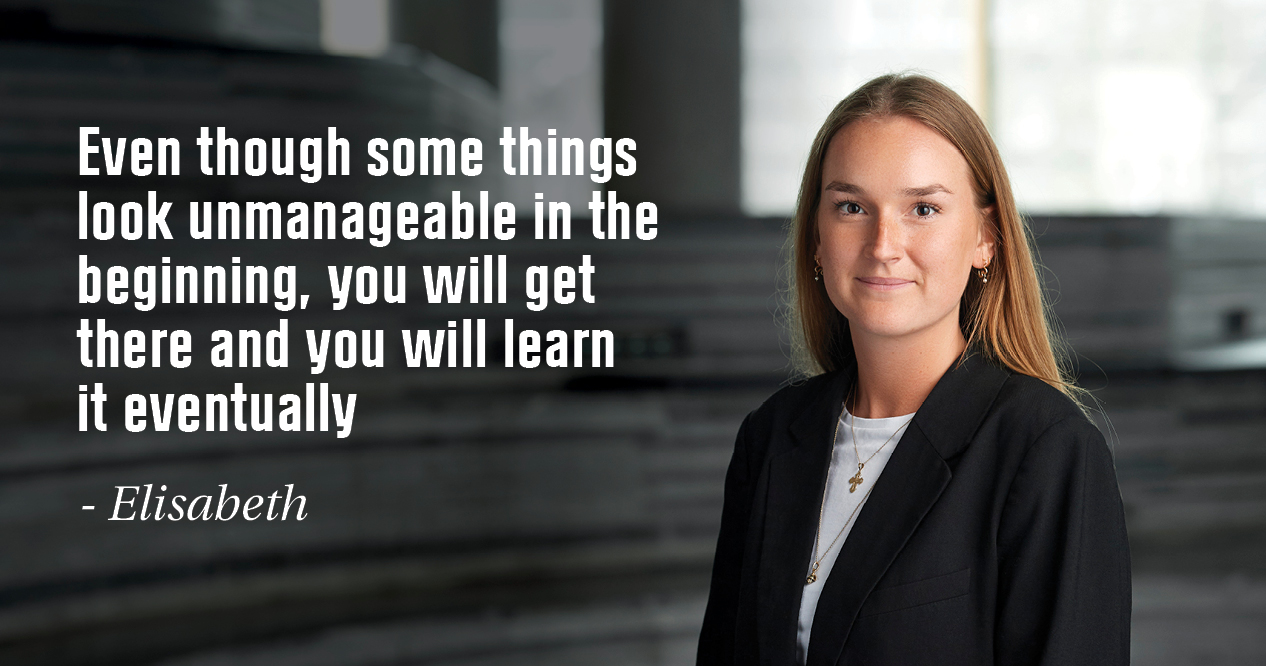MSc in Economics and Business Administration - Accounting, Strategy and Control
About the programme
Accounting is the language of business, and this program has a strong focus on how to master this language to facilitate value creating decision making and behaviour inside organizations.
Management accounting for planning and decision making
The core of the programme is understanding and using financial and non-financial information to facilitate decision making, financial planning and analysis. You will learn how to measure anything from product cost, customer profitability, business performance and company value, to employee satisfaction, carbon footprint and other sustainability measures.
You will learn about the strengths and weaknesses of these measurement tools, and how they can create a foundation for planning and decision making. The knowledge you gain from this will give you deep insight into the inner workings of the organisation and allow you to understand how value is created in the company, and at what cost.
Performance management
Measuring individual and organizational performance is the foundation for employees’ incentives to engage in value-creating behaviour. By developing and analysing performance and risk measurement systems, you can create transparency in the company, and identify potential strategic, tactical, and operational issues as they arise.
Such issues include sudden increases in expenses, reduced product quality, deteriorating customer satisfaction, high employee turnover or continuous difficulties in reaching sustainability goals. To deal with these problems, you will learn how to design and implement incentive systems through which you can coordinate and motivate departments, teams, and individuals to manage their behaviour and overcome important challenges.
Data analytics and communication skills
It requires strong quantitative skills to understand and apply both theoretical models and empirical methods in management accounting and financial management. Finance professionals of today are, however, also required to actively engage in financial analyses for strategic decision making as partners to business functions across the value chain. The programme helps you develop both the data analytics skills that are required to excel in increasingly digitized finance functions and the social skills required to create impactful engagements with the line of business across the organisation.
This enables you to become financially informed business partners who ensure data-driven strategic and operational decision making in dynamic business environments. Also, it contributes to your understanding that a finance function is not merely a support function within organisations. Instead, it serves as a crucial advisor to top management and the rest of the organisation, providing fact-based data to aid their decision-making. This requires advanced communication skills and the ability to engage with various stakeholders.
Customise your programme
During the programme, you have various opportunities to create your own academic profile.
Electives
On the 3rd semester, you can choose to study courses of your specific interest. CBS offers a large number of electives within a wide range of topics. You can also choose to take electives at other Danish universities. The electives you choose have to be relevant for your programme.
See the current selection of CBS electives on Single courses and electives - Master
Minor
On the 3rd semester, you can also choose to study a so-called minor. A minor is a package of electives within a specific academic area. Typically, it consists of 3 courses. By taking a minor, you strengthen your competences within a specific area of interest, and you can use it to qualify for specific jobs or industries.
See the current selection of CBS minors on Minors
Exchange
Many students choose to go on exchange on their 3rd semester; usually at one of CBS’ more than 300 partner universities. When you go on exchange through CBS, you do not have to pay for the teaching at the foreign university (with a few exceptions), and you can bring your SU (student grant).
Find a list of all CBS partner universities here
CEMS - Master in International Management programme
On, ASC you can apply for the CEMS - Master in International Management programme. CEMS MIM is a double degree programme, which gives you the opportunity to add a second degree in international management to your CBS degree. This means that you will get both the MSc degree and the CEMS in International Management degree.
CEMS is a 1-year programme, which you study in combination with your CBS degree in your 3rd and 4th semester. Part of it takes place at one of the other CEMS universities abroad.
Learn more about CEMS / Master in International Management
Master's thesis
Your 2nd year is completed with a master's thesis. You choose the topic you want to write about, which allows you to focus on a specific topic of your interest. Typically, you write your master's thesis with a fellow student.
What to consider
Interest in data-driven decision making
Management accounting deals with quantitative data. In this programme there is, however, a very strong focus on understanding numbers in a broad managerial context. Quantitative skills are therefore very useful. But to be a good match for this programme you should also have a strong interest in understanding the logic behind the numbers and the ability to reflect on underlying assumptions to conduct the right analyses and deduct proper business insights on this basis
Understanding numbers in a broader context
Working with numbers is a big part of the programme, but it is more calculus than math, and there is also a strong focus on understanding these numbers in context. This could mean bringing in both psychological and sociological perspectives. To be able to work with numbers, and at the same time understand how people are motivated, and why they behave in certain ways, can be a challenge to some because of the big differences in the approaches to creating knowledge in these areas. But it will also be rewarding as the ability to combine these hard and soft areas is one of the important skills you acquire.
Mix of theory and practice
Management accounting is an applied discipline. However, to critically reflect on the problems encountered in practice, you need a sincere interest in understanding, not just accounting and finance theory, but also psychological, behavioural, and sociological perspectives. You will work with developing your “hard skills” and “soft skills” simultaneously. This is to master the numbers, and at the same time understand how people are motivated, and why they behave in certain ways. Students who are committed to do this have good prospects of developing business partnering competencies that are in high demand in the CFO domain and in business in general.
Studying in English
If you do not have a bachelor’s degree taught in English, we recommend that you read more about what to consider before applying for an English taught programme.
Study environment
International environment and teamwork
The programme has an annual intake of about 80 students. So generally you have a good opportunity to socialise with fellow students who share your interests in management accounting and the CFO domain and to interact frequently with the ASC faculty and have a personalised learning experience.
The study environment at the programme is highly international with a significant proportion of foreign students. This creates an open-minded and cooperative atmosphere. And also, students are strongly encouraged to work in teams to improve their social skills and exploit the learning synergies that multi-cultural teamwork tends to bring. To strengthen the social bonds between students the ASC Social Committee organize various events during the programme such as dinners, excursions, and a Christmas Party.
Interaction with the corporate partners
Many students combine their studies with student jobs. This further adds a practical perspective that fuels productive discussions in and outside the classroom. Another practical facet of your learning journey is achieved through your active interaction with the programme’s corporate partners. These include the representatives from the finance functions of some of the largest global Danish corporations and top-tier consulting firms. This engagement will provide you with invaluable practical insights and a unique perspective on the business community.
Student life at CBS
Studying at CBS is much more than just preparing for and going to classes.
At CBS, there are more than 20,000 students with different backgrounds and nationalities. Teamwork is an essential part of studying at CBS both in classes and in extracurricular activities.
With more than 100 student organisations, you also have plenty of opportunities to engage and connect with students across programmes and classes.
Learn more about the vibrant student life at CBS, the student organisations, and the international environment on Student life
For internationals
If you are an international student, we have gathered a lot of information about what it is like to be an international student at CBS and how you can prepare for life in Denmark.
Read more on For internationals
Teaching
Classes in ASC are conducted as lectures and in some cases combined with exercises. As in all lectures, student interaction is important, and the quality often depends on the attitude of the students and their willingness to participate. For this reason, it is also customary to use cases, hand-in essays or have presentations by smaller groups of students.
There is a certain degree of progression between first and second semester courses. In the first semester you are introduced to core concepts and methods within management accounting and financial analysis. The core concepts and methods form the foundation on which discussions in the second semester will take place.
Read more about Teaching and working methods on Student life
Exams
The programme has both written and oral exams. The frequent use of oral exams underlines the approach to the topics in the programme, where great emphasis is put on being able to discuss the relevance, strength and weaknesses of the theories behind various tools or models. It is not uncommon for students to underestimate the time it actually takes to really understand how to use the theories and tools to the extent where you can explain and discuss them at an oral exam.
In the second semester there is an extended group project, where you go in more depth with a relevant topic and problem.
Read more about Exams and exams types on Student life
Time consumption
You should know that it is demanding to study in a graduate programme, and both the curriculum and workload is significantly higher than at bachelor level.
If you are studying on a full-time graduate programme, you should expect spending approximately 37 hours on average on your studies each week. The workload will vary during the year.
The time leading up to assignment submissions and exams can be hectic, and you can easily work more than 40 hours a week in this period. Preparing for oral exams can be especially time consuming, because you have to be able to explain and discuss the covered concepts and theories and learn things by heart.
Read more about Time consumption on Student Life
Student job
Most programmes are quite flexible in terms of combining studies with a student job. Most students work a maximum of 15 hours a week in order to have sufficient time for their studies.
Studying in Denmark - for internationals
If this is your first time studying in Denmark, you may find teaching and exam formats, the grading scale and the academic calendar very different from what you are used to.
Read about everything you need to know as an international student studying at CBS on For internationals > Academic information
Career
What gets you the job?
The demand for well-educated management accounting graduates is very high and the ASC programme has a strong reputation for developing high quality management accounting talents. Consequently, the employment rate for ASC graduates is close to 100%.
Employers particularly value the combination of extensive analytical skills and the ability to understand the behavior in the organisation and the motivation among employees from an economic perspective, which enables students to design and analyse measurement and incentive systems that can change the way the company works.
The ability to understand the underlying principles behind the numbers and to present business insights from data analyses in a way that creates value and transparency for both management and employees is also highly valued by employers.
Career opportunities
The majority of graduates find employment in one of the following three broad employer categories:
• Finance functions of companies (e.g., global finance graduate programs)
• Consulting services of Big 4 accounting firms (Deloitte, KPMG, PwC, EY)
• Management consulting firms
The competencies acquired at the programme are, however, extremely valuable in a broad range of careers in firms due to the program’s focus on applying financial management models and techniques to solving business problems.
Graduates of this programme are generally expected to enter different careers mainly in the private sector in Denmark and internationally. Typical job examples include:
Finance function of a company (examples):
• Finance Business Partner
• Business Controller
• Financial Controller
• Financial Analyst
• Business Intelligence Analyst
• ESG Controller
Consulting (examples):
• CFO Services consultant
• Business process consultant
• Performance management consultant
• Strategy consultant
• Management accounting software consultant
Other occupations (examples):
• Private equity associate
• Financial institutions analyst
• New ventures / Start-ups
Competence profile
In the competence profile you can find more information about the various competences you achieve on the programme:
Course overview
| 1st semester | 2nd semester | 3rd semester | 4th semester | ||
| 1st quarter | 2nd quarter | 3rd quarter | 4th quarter |
Electives / Exchange / CEMS (30 ECTS)
|
|
|
Management Accounting for Decision Making
|
Management Control
|
Performance Management and Incentives
|
Accounting for Sustainability
|
||
|
Financial Statement Analysis and Valuation
|
Data & Analytics in Management Accounting (7,5 ECTS)
|
Risk Management and Corporate Finance |
|||
| Business Project (7,5 ECTS) |
|||||
Note the programme is being renewed and minor changes in the content of the individual courses might occur.![]() See more information about the courses here.
See more information about the courses here.


